Understanding the Importance of Converting Energy Units: From Calories to Watt-Hours and Beyond
Energy conversion is a fundamental aspect of various fields, from fitness and nutrition to engineering and renewable energy. While common conversions like joules to kilojoules or calories to kilocalories are well-known, there are numerous less common but equally important conversions, such as calories to watt-hours. This blog post explores the significance of these conversions, their practical applications, and the professionals who use them.
Why Convert Calories to Watt-Hours?
The conversion between calories (cal) and watt-hours (Wh) might seem unconventional, but it serves several unique purposes. Here are some reasons why this conversion is useful:
1. Fitness and Exercise Equipment
Many fitness devices, such as treadmills, stationary bikes, and elliptical machines, display energy expenditure in calories. For users interested in understanding this energy in terms of electrical energy, converting calories to watt-hours can be insightful. This conversion helps in comparing the energy burned during a workout to the energy required to power electrical devices.
Example Calculation:
If a person burns 500 calories during a workout, how much electrical energy is that?
\[ \text{Energy (Wh)} = \text{Energy (cal)} \times 0.001163 \]
\[ 500 \, \text{cal} \times 0.001163 \, \text{Wh/cal} \approx 0.5815 \, \text{Wh} \]
This means the energy expended during the workout is approximately 0.5815 watt-hours.
2. Human Power and Renewable Energy
In scenarios where human power is used to generate electricity, such as pedal-powered generators, converting the energy expenditure in calories to watt-hours can help estimate the electrical energy output. This conversion is essential in designing and evaluating human-powered devices and understanding their efficiency.
Example Calculation:
If a person pedals a generator and burns 700 calories, how much electrical energy is produced?
\[ 700 \, \text{cal} \times 0.001163 \, \text{Wh/cal} \approx 0.8141 \, \text{Wh} \]
The energy generated is approximately 0.8141 watt-hours.
3. Educational Purposes
In educational settings, converting between different units of energy helps students understand the concepts of energy and its various forms. This conversion bridges the gap between different disciplines like physics, nutrition, and engineering, making it a valuable educational tool.
4. Comparing Energy Sources
Converting the energy content of food to electrical energy provides a unique perspective on energy consumption and expenditure. For instance, understanding how much electrical energy is equivalent to the calories in a meal can be intriguing.
Example Calculation:
If a chocolate bar contains 250 calories, how much electrical energy is that?
\[ 250 \, \text{cal} \times 0.001163 \, \text{Wh/cal} \approx 0.29075 \, \text{Wh} \]
The energy content of the chocolate bar is approximately 0.29075 watt-hours.
Types of Professionals Who Use Energy Conversions
Various professionals use energy conversions in their work. Here are some examples:
1. Fitness Trainers and Exercise Physiologists
Fitness trainers and exercise physiologists often monitor and analyze the energy expenditure of their clients. Converting calories burned during exercise to watt-hours can help in designing efficient workout plans and understanding the energy dynamics of physical activities.
2. Renewable Energy Engineers
Engineers working on human-powered generators and renewable energy projects use these conversions to evaluate the efficiency of their designs. Understanding the relationship between human energy expenditure and electrical energy output is crucial for optimizing these systems.
3. Educators and Researchers
Teachers and researchers in physics, nutrition, and engineering use energy conversions to illustrate concepts and conduct experiments. These conversions help students and researchers understand the practical implications of energy transformations.
4. Dietitians and Nutritionists
Dietitians and nutritionists might use these conversions to compare the energy content of food to other forms of energy. This can help in educating clients about energy balance and the broader implications of their dietary choices.
Detailed Conversion Formulas
Here are the detailed formulas for converting between calories and watt-hours:
From Calories to Watt-Hours
\[ 1 \, \text{cal} = 4.184 \, \text{J} \]
\[ 1 \, \text{Wh} = 3600 \, \text{J} \]
\[ \text{Energy (Wh)} = \text{Energy (cal)} \times \frac{4.184 \, \text{J}}{1 \, \text{cal}} \times \frac{1 \, \text{Wh}}{3600 \, \text{J}} \]
This simplifies to:
\[ 1 \, \text{cal} = 4.184 \, \text{J} \times \frac{1 \, \text{Wh}}{3600 \, \text{J}} \]
\[ 1 \, \text{cal} \approx 0.001163 \, \text{Wh} \]
Therefore:
\[ \text{Energy (Wh)} = \text{Energy (cal)} \times 0.001163 \]
From Watt-Hours to Calories
\[ 1 \, \text{Wh} = 3600 \, \text{J} \]
\[ 1 \, \text{cal} = 4.184 \, \text{J} \]
\[ \text{Energy (cal)} = \text{Energy (Wh)} \times \frac{3600 \, \text{J}}{1 \, \text{Wh}} \times \frac{1 \, \text{cal}}{4.184 \, \text{J}} \]
This simplifies to:
\[ 1 \, \text{Wh} = 3600 \, \text{J} \times \frac{1 \, \text{cal}}{4.184 \, \text{J}} \]
\[ 1 \, \text{Wh} \approx 860.421 \, \text{cal} \]
Therefore:
\[ \text{Energy (cal)} = \text{Energy (Wh)} \times 860.421 \]
And There You Have It...
Understanding the various reasons and use cases for converting energy units, such as calories to watt-hours, highlights the importance of these conversions in different fields. Whether you're a fitness trainer, renewable energy engineer, educator, or dietitian, these conversions provide valuable insights and practical applications. By exploring these less common conversions, we gain a deeper appreciation for the interconnectedness of energy measurements and their relevance in our daily lives.







